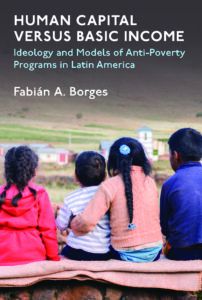 Human Capital vs. Basic Income: Ideology and Models of Cash Transfer Programs in Latin America (University of Michigan Press, 2022), studies how government ideology influences the adoption and design of anti-poverty programs in that region.
Human Capital vs. Basic Income: Ideology and Models of Cash Transfer Programs in Latin America (University of Michigan Press, 2022), studies how government ideology influences the adoption and design of anti-poverty programs in that region.
Latin America underwent two major transformations during the 2000s: the widespread election of left-leaning presidents (the so-called left turn) and the diffusion of conditional cash transfer programs (CCTs)—innovative social programs that award regular stipends to poor families on the condition that their children attend school. Combining cross-national quantitative research covering the entire region and in-depth case studies based on field research, Human Capital versus Basic Income: Ideology and Models for Anti-Poverty Programs in Latin America challenges the conventional wisdom that these two transformations were unrelated. This book demonstrates that this ideology greatly influenced both the adoption and design of CCTs.
There came to be two distinct models of CCTs: a “human capital” model based on means-tested targeting and strict enforcement of program conditions, exemplified by the program launched by Mexico’s right, and a more universalistic “basic income” model with more permissive enforcement of conditionality, exemplified by Brazil’s program under Lula. These two models then spread across the region. Whereas right and center governments, with assistance from international financial institutions, enacted CCTs based on the human capital model, the left, with assistance from Brazil, enacted CCTs based on the basic income model.

Show Me The Money!: Bolivia’s Bono Juancito Pinto program, a CCT enacted by a left-wing government, provides a regular stipend to all public-school students.
The existence of two distinct types of CCTs and their relation to ideology is supported by quantitative analyses covering the entire region and in-depth case studies based on field research in three countries. Left-wing governments operate CCTs that cover more people and spend more on those programs than their center or right-wing counterparts. Beyond coverage, a subsequent analysis of the 10 national programs adopted after Lula’s embrace of CCTs confirms that program design—evaluated in terms of scope of the target population, strictness of conditionality enforcement, and stipend structure—is shaped by government ideology. This finding is then fleshed out through case studies of the political processes that culminated in the adoption of basic income CCTs by left-wing governments in Argentina and Bolivia and a human capital CCT by a centrist president in Costa Rica.
A digital version of the book can be read and downloaded via University of Michigan Press.
You can also read reviews of the book that have been published in Perspectives on Politics, Journal of Latin American Studies, Bulletin of Latin American Research, and Latin American Policy.
Reviews
“This is a masterful and monumental work, and I am confident that it will make a significant impact in the areas/literatures on Latin American politics and on public policy. This extremely well researched and well written book puts forth many thoughtful insights that have remained somewhat latent in the literature on CCTs to date; synthesizes a vast amount of information in an interesting way; and brings to bear important new empirical findings.”
—Wendy Hunter,
University of Texas at Austin“The book is impressive in its detailed attention to country-level policy developments, its familiarity with the vast literature on conditional income transfers, and its judicious employment of statistical methods to test for multiple hypotheses regarding the emergence of the programmes. (…) It deserves a wide readership among researchers, students, policy-makers and those with an interest in Latin American social policy and society.”
—Armando Barrientos,
University of Manchester“An innovative and well‐founded approach that advances the study of social policies, comprehending their interrelation with political dynamics across various trajectories of CCT diffusion and design. (…) It comes highly recommended for scholars and policymakers invested in understanding social policies and fostering poverty alleviation within the region.”
—E. Fernanda Barreto
Facultad Latinoamericana de Ciencias Sociales, Mexico“In short, the book is a must-read for Latin American political economy students, especially the politics of social policy and the policy-making process. (…) It represents a valuable addition to the bookshelves of anyone interested in anti-poverty endeavours in the developing world of the twenty-first century.“
—Shiao Wang
Tsinghua University, China
